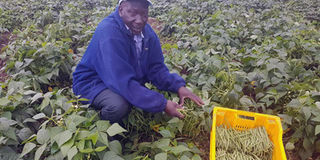Export crop lures small-scale farmers from maize

Paul Ng’ang’a, a farmer in Uasin Gishu in his French beans farm. Farmers in the region are taking up horticulture, growing in particular French beans for export. PHOTO | RACHEL KIBUI | NATION MEDIA GROUP
What you need to know:
- Farmers in the region are diversifying to other crops to boost their incomes amid rising challenges associated with growing maize.
- Requirements for Global-Gap certification include having a qualified spray man, a chemical store, grading shades and permanent and temporary block tags for ease of traceability.
- The produce is mainly sold in European Union, Australia and Dubai.
A visitor traversing Trans-Nzoia County would understand why the region is referred to as the country’s breadbasket.
Acres upon acres of land are under maize, with the crop stretching as far as the eye can see. But despite the domination of maize, some small-scale farmers are going against the grain.
The farmers are taking up horticulture, growing in particular French beans for export.
Paul Ng’ang’a, a farmer in Kabolet village, some 60km from Kitale town, is among those who are seeking new fortunes in French beans, having grown maize and beans for decades.
The farmer and his six workers are busy harvesting the beans when we arrive.
The crop occupies an acre of his five, having grown the beans to test the waters first. The rest hosts maize, the crop he says he is phasing out gradually.
“It is now about a year since I started growing French beans for export and this is my second season. I am now keen on them occupying the rest of the farm,” says Ng’ang’a, who notes that he has this season harvested 4,000kg of French beans from the one-acre plantation.
He anticipates to hit 6,000kg by the time he completes harvesting in three weeks.
Ng’ang’a is contracted to grow the crop by VegPro, a horticultural produce export company, which means he is assured of market.
He earns Sh40 per kilo, an indication that he is set to make a tidy sum from his one acre, with the crop maturing in two months.
“If I were growing maize, I would harvest about 20 bags from the acre, earning me between Sh40,000 to Sh50,000 after seven months,” says Ng’ang’a, who was introduced to the crop by agents of Kenya Agricultural Value Chain Enterprises (Kaves), a programme run by USAID.
EARNS THREE TIMES
To grow the crop, he prepares the land by digging deep to soften the soil and plants certified seeds as advised by the buyer, who also provides the inputs. He spaces the crop at 15cm between plants and 30cm between columns.
“One acre takes 10kg of seeds and I apply DAP before planting and top-dresses with CAN twice, when the crop has three leaves and at flowering stage,” explains the farmer, who weeds the crop at two weeks after planting and repeats after two weeks.
Harvesting starts at between 45-55 days and continuous for about six weeks, delivering the crop to VegPro.
Ng’ang’a says he plans to increase his French beans acreage to five years as one invests Sh80,000 and earns three times.
Away from his farm, Phyllis Munyangi grows French beans on half-an-acre of her three.
She was growing maize and beans until 2015, when she diversified into French beans.
She is one of the 20 members of Cherengani Horticulture Group, which practices small-scale French beans farming for export.
“During the dry season, we lease land from farmers adjacent to rivers at Sh2,000 per acre so that we can irrigate and sustain the market.”
She pays Sh2,000 per acre for four months, usually from October to January when maize farmers leave their lands idle.
She started with a tenth of an acre from which she harvested 600kg selling at Sh40 for each. Motivated by the income, Phyllis has now increased her French beans acreage to 0.5.
However, growing the crop is not all rosy as farmers have to contend with white flies and thrips.
DIVERSIFYING TO OTHER CROPS
Uasin Gishu County Chief Officer in-charge of Agriculture Mary Nzomo says a number of farmers in the region are diversifying to other crops to boost their incomes amid rising challenges associated with growing maize.
She says through Kaves, 100 small-scale farmers in the region have been awarded Global Good Agricultural Practices (GAP) certification to grow the beans for export.
Requirements for Global-Gap certification include having a qualified spray man, a chemical store, grading shades and permanent and temporary block tags for ease of traceability.
Kaves horticultural expert Bernard Ngala says they target to introduce at least 200,000 farmers to horticulture by 2018 across the country.
VegPro agronomist John Kirunje says the hot and wet climate and altitude of between 1,800-1,900 in Trans-Nzoia is perfect for horticultural farming.
Last year, Kirunje says VegPro exported 323 metric tonnes of French beans, 54 tonnes of garden peas 48 and 10 tonnes of snow peas and sugar snaps respectively. The produce is mainly sold in European Union, Australia and Dubai.





